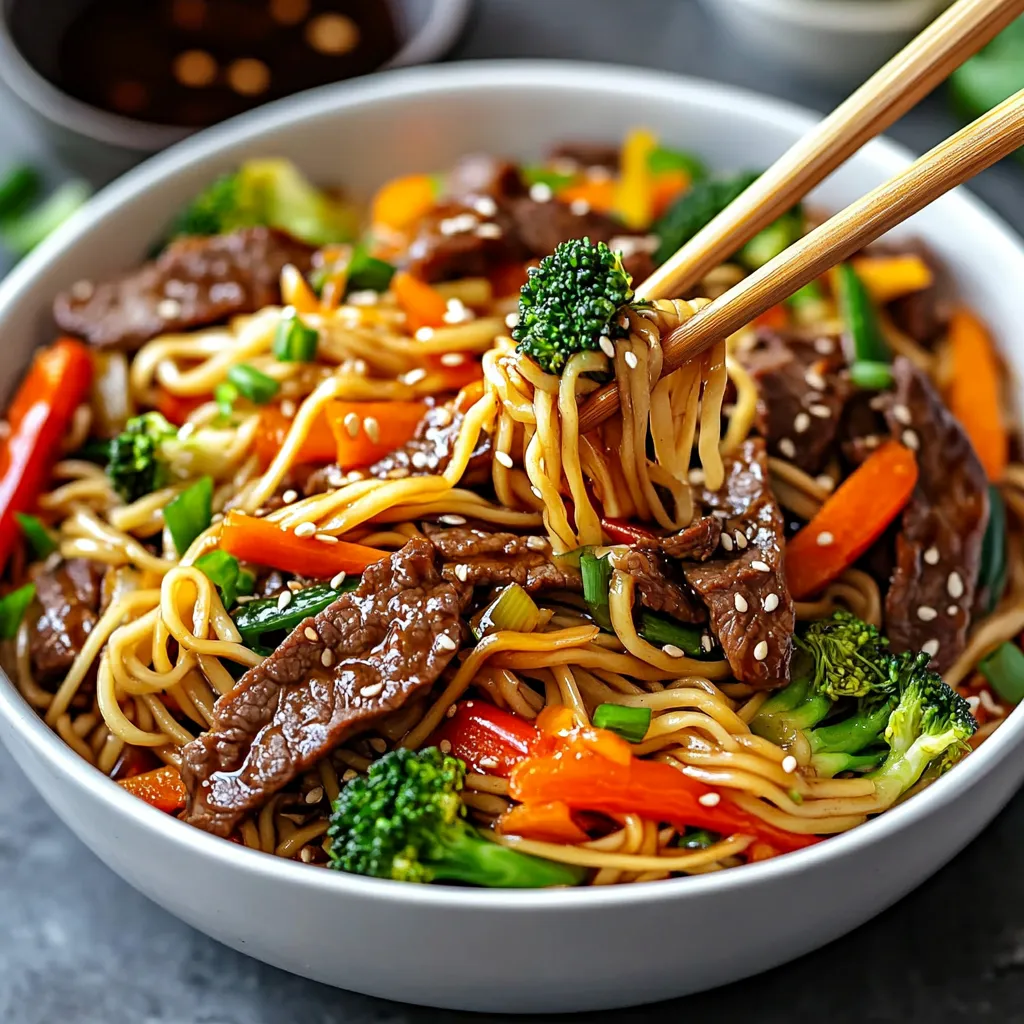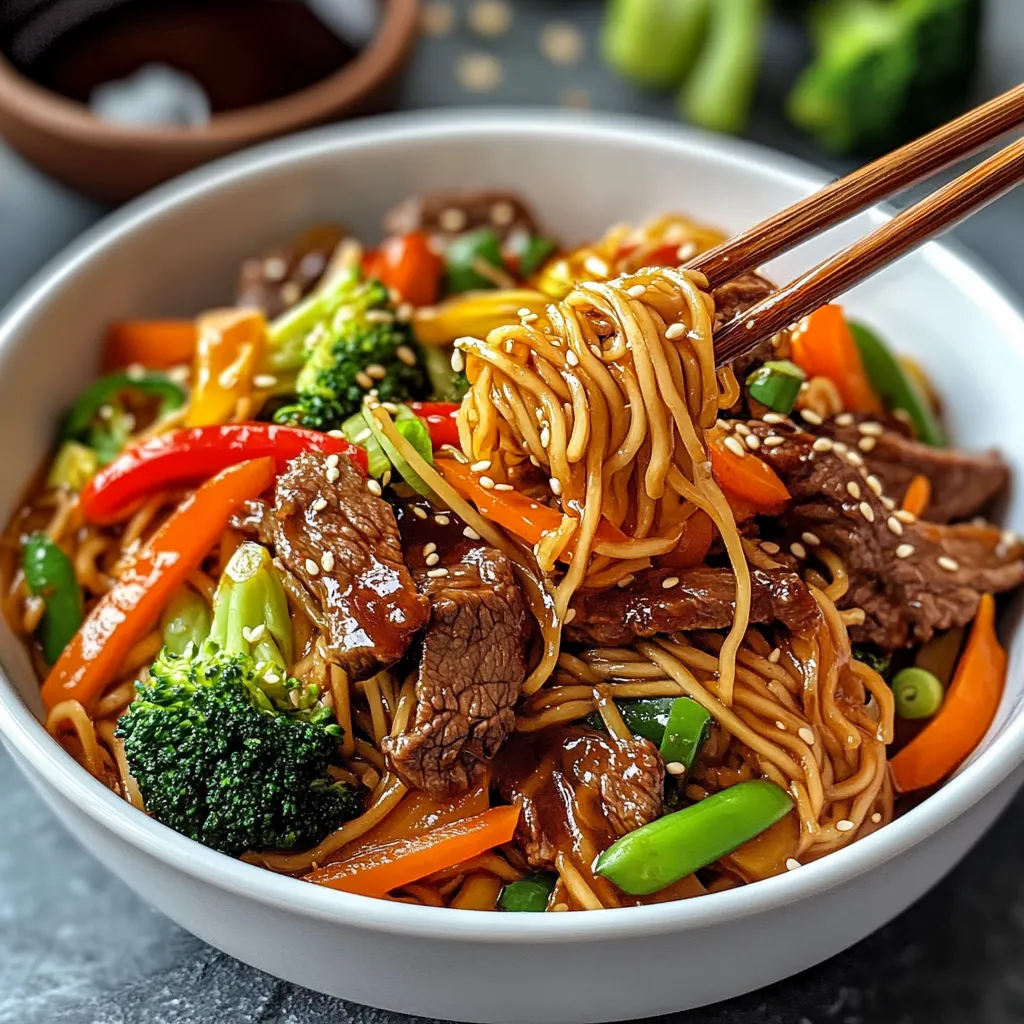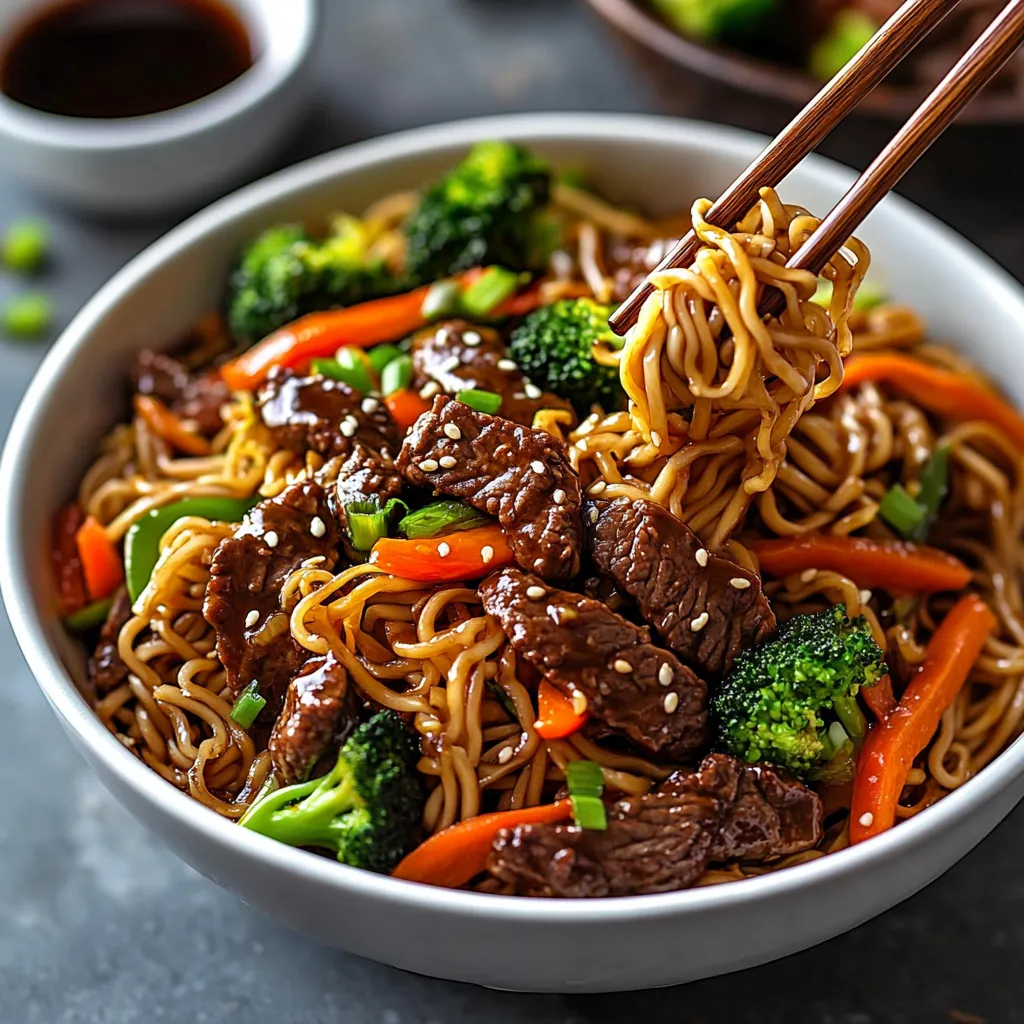 Pin it
Pin it
Tender strips of beef mingle with colorful vegetables and chewy noodles, all coated in a glossy homemade teriyaki sauce that perfectly balances sweet and savory flavors. This restaurant-quality dish brings incredible depth with every forkful while being surprisingly simple to create in your own kitchen. The vibrant colors and enticing aromas make this meal as visually appealing as it is delicious, turning an ordinary weeknight dinner into something truly special.
I first made these teriyaki noodles after a particularly exhausting workday when takeout seemed like the only option. The aroma filling my kitchen reminded me why homemade always trumps delivery. My husband now requests this dish at least twice monthly, claiming it beats our local Japanese restaurant's version. The satisfaction of creating something this delicious in such little time makes it a true kitchen victory.
Flavor Building Blocks
- Flank steak: Choose deep red pieces with visible grain for ideal texture; slice against the grain to maximize tenderness and ensure quick cooking
- Egg noodles: Their slightly bouncy texture perfectly absorbs the teriyaki sauce; look for fresh varieties in the refrigerated section for superior taste
- Cornstarch: Creates velvety coating on beef and luscious thickness in sauce; store in airtight container to prevent clumping
- Garlic cloves: Select firm bulbs with tight skin for most potent flavor; mince finely to distribute aromatic compounds throughout dish
- Fresh ginger: Firm pieces with smooth skin indicate freshness; peel before grating to release zingy warmth that complements beef beautifully
- Bell peppers: Bright, glossy skins signal optimal ripeness; different colors add visual appeal and subtle flavor variations
- Broccoli florets: Look for tight, dark green clusters that indicate freshness; cutting into similar-sized pieces ensures even cooking
- Carrots: Sweet varieties add natural complexity to dish; julienne cuts cook quickly while maintaining pleasant crunch
- Green onions: Both white and green parts contribute different flavor profiles; slice diagonally for professional presentation
- Soy sauce: Low-sodium varieties allow better control over final saltiness; naturally fermented brands provide deeper umami notes
- Mirin: This sweet Japanese cooking wine adds authentic complexity; true mirin contains alcohol which cooks off leaving subtle sweetness
- Brown sugar: Light varieties dissolve more easily while dark ones offer deeper molasses notes; both balance soy sauce's saltiness
- Sesame oil: A little goes remarkably far; store in refrigerator after opening to preserve its distinctive nutty aroma
Cooking Method
- Prepare The Beef
- Place thin slices of flank steak in a medium bowl and sprinkle with cornstarch. Using your fingers, gently toss the meat until each piece has a light coating of the white powder. This step creates a protective barrier that locks in moisture while creating a delicate crust when seared. Allow the coated beef to rest momentarily while preparing other ingredients.
- Ready The Noodles
- Bring a large pot of water to a rolling boil, adding a generous pinch of salt for flavor development. Add your chosen noodles and cook according to package instructions, stirring occasionally to prevent sticking. Test for doneness by sampling a strand—it should be tender yet retain a slight chew. Drain thoroughly in a colander, then rinse briefly with cool water to halt cooking. Toss with a tiny drizzle of oil to prevent clumping while you complete other steps.
- Create Teriyaki Magic
- In a small bowl, combine low-sodium soy sauce, mirin, brown sugar, and a few drops of sesame oil. Whisk until sugar completely dissolves into the liquid. In a separate tiny bowl, mix cornstarch with cold water until smooth, then stir this slurry into your sauce mixture. This preparation ensures your sauce will thicken beautifully when heated without forming unpleasant lumps.
- Sear The Beef
- Heat a wok or large skillet until droplets of water instantly evaporate when flicked onto the surface. Add oil and swirl to coat the cooking surface. Working in small batches to avoid overcrowding, carefully arrange beef slices in a single layer. Allow them to sear undisturbed for about 45 seconds before gently turning each piece. The exterior should develop a beautiful caramelized color while the interior remains juicy. Transfer cooked pieces to a clean plate and repeat with remaining beef.
- Vegetable Symphony
- Return the pan to high heat and add remaining oil. Add minced garlic and grated ginger, stirring constantly as they release their aromatic essences. After about 30 seconds, introduce diced onions, cooking until they become translucent. Add bell peppers, broccoli, and carrots, tossing continuously to promote even cooking. Maintain high heat to develop slight charring on edges while preserving crisp-tender texture.
- Unite The Elements
- Pour your prepared teriyaki sauce around the perimeter of the hot pan, allowing it to bubble dramatically as it makes contact with the heated surface. As it begins to thicken, return the seared beef to the pan, followed by the cooked noodles. Using tongs or two wooden spoons, gently lift and fold the ingredients together until everything gleams with sauce. The noodles will continue absorbing flavors as you toss, so work efficiently to prevent overcooking.
 Pin it
Pin it
My personal weakness in this recipe is the sauce-soaked noodles. Something almost magical happens when the starchy strands absorb that sweet-savory teriyaki magic. My youngest daughter initially refused to try this dish until she watched everyone else enjoying it so enthusiastically. Her first tentative bite led to a clean plate and subsequent requests for "the noodles with the brown sauce" at least weekly. Even my mother, who typically avoids Asian flavors, requested the recipe after joining us for dinner last month.
Perfect Pairings
Transform your beef teriyaki noodles into a complete dining experience with thoughtfully selected accompaniments. Simple steamed edamame sprinkled with flaky sea salt provides a protein-rich starter that primes the palate for the main course. For added freshness, consider serving a small cucumber salad dressed with rice vinegar and a touch of sugar, its crisp texture and tangy flavor offering delightful contrast to the rich noodles. Warm sake or a crisp Asian lager complements the umami flavors brilliantly, while jasmine tea provides a caffeine-free alternative that cleanses the palate between bites.
Creative Twists
Reimagine this versatile dish with thoughtful variations that maintain its essence while exploring new flavor territories. For a spicier experience, incorporate sliced fresh chilies or a dollop of chili crisp oil when tossing the final dish. Seafood enthusiasts might substitute shrimp or scallops for beef, reducing cooking time accordingly to preserve their delicate texture. Vegetarians can replace meat with extra-firm tofu, pressed and cubed, or meaty portobello mushrooms sliced into substantial strips. Consider a Korean-inspired adaptation by adding a tablespoon of gochujang to the sauce mixture, creating deeper color and subtle heat that transforms the flavor profile completely.
Keeping It Fresh
Extend your enjoyment of this flavorful dish by properly storing any leftovers for maximum quality retention. Transfer completely cooled portions to shallow containers with tight-fitting lids, allowing faster cooling in the refrigerator and preventing texture degradation. When properly stored, these noodles maintain their quality for up to three days, though the vegetables will gradually soften over time. Reheat gently in a covered skillet over medium-low heat, adding a splash of water or broth to rehydrate noodles that may have absorbed excess sauce during storage. For best texture, consume refrigerated portions within two days when the noodles still maintain their distinct chewiness.
My relationship with this recipe evolved over countless iterations, each one teaching me something valuable about balance and technique. What began as an attempt to recreate my favorite restaurant dish has become something uniquely mine, adjusted to suit my family's preferences. The satisfaction of creating something this flavorful in my own kitchen never diminishes. There's something deeply rewarding about transforming simple ingredients into something that brings such joy to those around my table. When cooking feels like too much effort, I remember these noodles and how little time separates me from something truly delicious.
 Pin it
Pin it
Frequently Asked Questions
- → What type of beef is best for this recipe?
- Flank steak is recommended for its tenderness and flavor.
- → Can I use a different type of noodle?
- Yes, you can use any type of noodle you prefer, such as udon or ramen noodles.
- → How can I make the teriyaki sauce less sweet?
- Reduce the amount of brown sugar or mirin in the sauce to make it less sweet.
- → What can I serve with this dish?
- Serve with a side of steamed rice or a simple green salad for a complete meal.
- → How long does this recipe take to prepare?
- It takes about 20 minutes to prep and 20 minutes to cook, totaling 40 minutes.
